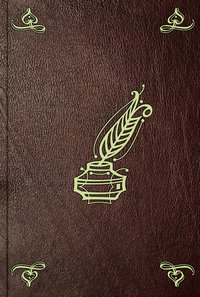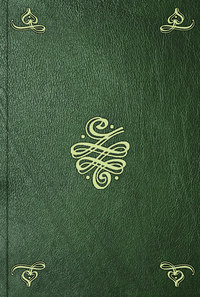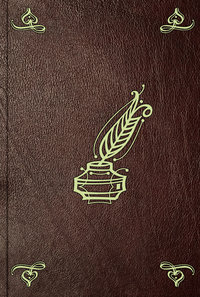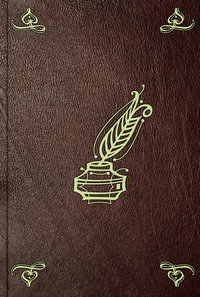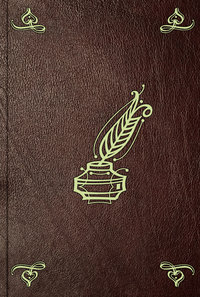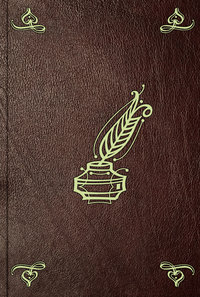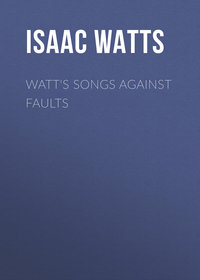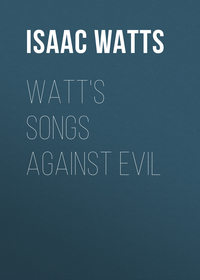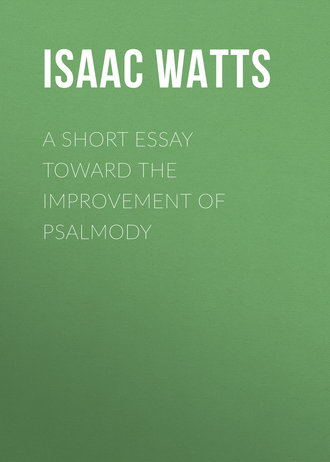 полная версия
полная версияA Short Essay Toward the Improvement of Psalmody
The Patrons of another Opinion will say we must sing the Words of David, and apply them in our Meditation to the things of the New Testament: But can we believe this to be the best Method of worshiping God, to sing one thing and mean another? besides that the very literal Sense of many of many of these Expressions is exceeding deep and difficult, and not one in twenty of a religious Assembly can possibly understand them at this Distance from the Jewish Days; therefore to keep close to the Language of David, we must break the Commands of God by David, who requires that we sing his Praises with Understanding, Psal. 47.7. And I am perswaded, that St. Paul if he lived in our Age and Nation, would no more advise us to sing unintelligible Sentences in London, than himself would sing in an unknown Tongue at Corinth, 1 Cor. 14. 15, 19. After all, if the literal Sense were known, yet the Application of many Verses of David to our State and Circumstances was never design'd, and is utterly impossible; and even where it is possible, yet 'tis so exceeding difficult that very few Persons in an Assembly are capable of it; and when they attempt it, if their Thoughts should be enquir'd one by one, you would find very various, wretched, and contradictory Meanings put upon the Words of the Hebrew Psalmist, and all for want of an Evangelical Translation of him. 'Tis very obvious and common to observe that Persons of Seriousness and Judgment that consider what they sing, are often forced to break off in the midst, to omit whole Lines and Verses, even where the best of our present Translations at used; and thus the Tune, and the Sense, and their Devotion is interrupted at once, because they dare not sing without understanding, and almost against their Consciences. Whereas the more unthinking Multitude go on singing in chearful Ignorance wheresoever the Clerk guides them, a-cross the River Jordan, thro' the Land of Gebal, Ammon and Amalek; He leads 'em into the strong City, he brings them into Edom; Anon they follow him thro' the Valley of Bacha, till they come up to Jerusalem; they wait upon him into the Court of Burnt-Offerings, and bind their Sacrifice with Cords to the Horns of the Altar; they enter so far into the Temple, till they join their Song in Consort with the high sounding Cymbals, their Thoughts are be-darkened with the Smoke of Incense, and cover'd with Jewish Veils. Such Expressions as these are the beauties and Perfections of a Hebrew Song, they paint every thing to the Life: Such Language was suited by Infinite Wisdom to raise the Affections of the Saints of that Day: But I fear they do but sink our Devotion, and hurt our Worship.
I esteem the Book of Psalms the most valuable Part of the Old Testament upon many Accounts: I advise the Reading and Meditation of it more frequently than any single Book of Scripture; and what I advise I practise. Nothing is more proper to furnish our Souls with devout Thoughts, and lead us into a World of Spiritual Experiences: The Expressions of it that are not Jewish or peculiar, give us constant Assistance in Prayer and in Praise: But yet if we would prepare David's Psalms to be sung by Christian Lips, we should, observe these two plain Rules.
First, They ought to be translated its such a Manner as we have reason to believe David would have compos'd 'em if he had lived in our Day: And therefore his Poems are given as a Pattern to be imitated in our Composures, rather than as the precise and invariable Matter of our Psalmody. 'Tis one of the Excellencies of Scripture-Songs, that they are exactly suited to the very Purpose and Design for which they were written, and that both in the Matter, in the Stile, and in all their Ornaments: This gives Life and Strength to the Expression, it presents Objects to the Ears and to the Eyes, and touches the Heart in the most affecting Manner. David's Language is adapted to his own Devotion, and to the Worship of the Jewish Church; he mentions the very Places of his Journies, or Retirements, of his Sorrows, or his Successes; He names the Nations that were Enemies of the Church, or that shall be its Friends and tho for the most part he leaves the single Persons of his Time nameless in the Body of his Psalm, yet he describes them there with great Particularity, and often names them in the Title. This gives us abundant Ground to infer, that should the Sweet-Singer of Israel return from the Dead into our Age, he would not sing the Words of his own Psalms without considerable Alteration; and were he now to transcribe them, he would make them speak the present Circumstances of the Church, and that in the Language of the New Testament: He would see frequent Occasion to insert the Cross of Christ in his Song, and often interline the Confessions of his Sins with the Blood of the Lamb; often would he describe the Glories and the Triumphs of our blessed Lord in long and flowing Verse, even as St. Paul, when he mentions the Name and Honours of Christ can hardly part his Lips from 'em again: His Expressions would run ever bright and clear; such as here and there we find in a single Verse of his old Composures, when he is transported beyond himself, and carried far away from Jewish Shadows by the Spirit of Prophecy and the Gospel. We have the more abundant Reason to believe this, if we observe, that all along the sacred History as the Revelations of God and his Grace were made plainer, so the Songs of the Saints express'd that Grace and those Revelations according to the Measure of their Clearness and Increase. Let us begin at the Song of Moses, Exod. 15. and proceed to David and Solomon, to the Song of the Virgin Mary, of Zecharias, Simeon, and the Angels, the Hosanna of the young Children, the Praises paid to God by the Disciples in the Acts, the Doxologies of Paul, and the Songs of the Christian Church in the Book of the Revelations: Every Beam of new Light that broke into the World gave occasion of fresh joy to the Saints, and they were taught to sing of Salvation in all the Degrees of its advancing Glory.
Secondly, In the Translation of Jewish Songs for Gospel-Worship, if Scripture affords us any Example, we should be ready to follow it, and the Management thereof should be a Pattern for us. Now tho the Disciples and primitive Christians had so many and so vast Occasions for Praise, yet I know but two Pieces of Songs they borrow'd from the Book of Psalms. One is mention'd in Luke 19.38.
Where the Disciples assume a Part of a Verse from the 118th Psalm, but sing it with Alterations and Additions to the Words of David.
The other is the Beginning of the second Palm, sung by Peter and John and their Company, Acts 4. 23, 24, &c. You find there an Addition of Praise in the Beginning, Lord thou art God which hast made Heaven and Earth, and the Sea, and all that in them is. Then there is a Narration of what David spoke, who by the Mouth of thy servant David hast said, &c. Next follow the two first Verses of that Psalm, but not in the very Words of the Psalmist: Afterwards an Explication of the Heathen and the People, (viz.) the Gentiles and Israel: The Kings and the Rulers, (viz.) Herod and Pontius Pilate, and the Holy Child Jesus, is God's anointed. Then there is an Enlargement of the Matter of Fact by a Consideration of the Hand of God in it, and the Song concludes with the breathing of their Desires towards God for Mercies most precisely suited to their Day and Duty; and you find when they had sung, they went to Prayer in the Assembly, and then they preached the Word of God by the holy Ghost, and with amazing Success. O may I live to see Psalmody perform'd in these evangelick Beauties of Holiness! May these Ears of mine be entertain'd with such Devotion in Publick, such Prayer, such Preaching, and such Praise! May these Eyes behold such returning Glory in the Churches! Then my Soul shall be all Admiration, my Tongue shall humbly attempt to mingle in the Worship, and assist the Harmony and the Joy.
After we have found the true Method of translating Jewish Songs for the Use of the Christian Church, let us enquire also how lawful and necessary 'tis to compose Spiritual Songs of a more evangelic Frame for the Use of Divine Worship under the Gospel.
The First Argument I shall borrow from all the foregoing Discourse concerning the Translation of the Psalms of David: For by that time they are fitted for Christian Psalmody, and have all the Particularities of Circumstance that related to David's Person, and Times alter'd and suited to our present Case; and the Language of Judaism is chang'd into the Stile of the Gospel; the Form and Composure of the Psalm can hardly be called inspired or Divine: only the Materials or the Sense contain'd therein may in a large Sense be called the Word of God, as it is borrowed from that Word. Why then may it not be esteemed as lawful to take some Divine Sense and Materials agreeable to the Word of God, and suited to the present Case and Experience of Christians, and compose them into a Spiritual Song? Especially when we cannot find one ready pen'd in the Bible, whose Subject is near a-kin to our present Condition, or whose Form is adapted to our present Purpose.
The Second Argument shall be drawn from the several Ends and Designs of Singing, which can never be sufficiently attain'd by confining ourselves to David's Psalms, or the Words of any Songs in Scripture. The first and chief intent of this part of Worship, is to express unto God what Sense and Apprehensions we have of his Essential Glories; and what notice we take of his Works of Wisdom and Power, Vengeance and Mercy; 'tis to vent the inward Devotion of our Spirits in Words of Melody, to speak our own Experience of divine Things, especially our religious Joy; 'twould be tiresom to recount the endless Instances out of the Book of Psalms and other divine Songs, where this is made the chief Business of them. In the Texts of the New Testament where Singing is requir'd, the same Designs are propos'd; when the Ephesians are filled with the Spirit, the Enlightner and Comforter, they are charged to indulge those Divine Sensations, and let them break out into a Spiritual Song, Eph. 5.19. When any is merry or chearful, the Apostle James bids him express it by Singing. Giving Thanks unto God, is the Command of St. Paul to the Saints while he injoins Psalmody on them; And speaking the Wonders of his Power, Justice and Grace, is the Practice of the Church constantly in the Visions of St. John. To teach and admonish one another, is mention'd by St. Paul as another Design of Singing; the Improvement of our Meditations, and the kindling Divine Affections Within our selves, is one of the Purposes also of religious Melody, if Eph. 5. 19. be rightly translated. Now, how is it possible all these Ends should be attain'd by a Christian, if he confines his Meditations, his Joys, and his Praises, to the Hebrew Book of Psalms? Have we nothing more of the Nature of God revealed to us than David had? Is not the Mystery of the ever-blessed Trinity brought out of Darkness into open Light? Where can you find a Psalm that speaks the Miracles of Wisdom and Power as they are discover'd in a crucify'd Christ? And how do we rob God the Son of the Glory of his dying Love, if we speak of it only in the gloomy Language of Smoke and Sacrifices, Bullocks and Goats, and the Fat of Lambs? Is not the Ascent of Christ into Heaven, and his Triumph over Principalities and Powers of Darkness a nobler Entertainment for our tuneful Meditations than the removing of the Ark up to the City of David, to the Hill of God, which is high as the Hill of Bashan? Is not our Heart often warm'd with holy Delight in the Contemplation of the Son of God our dear Redeemer whose Love was stronger than Death? Are not our Souls possess'd with a Variety of Divine Affections, when we behold him who is our chief Beloved hanging on the cursed Tree, with the Load of all our Sins upon him, and giving up his Soul to the Sword of Divine Justice in the stead of Rebels and Enemies? And must these Affections be confin'd only to our own Bosoms, or never break forth but in Jewish Language, and Words which were not made to express the Devotion of the Gospel? The Heaven and the Hell that we are acquainted with by the Discovery of God our Saviour, give us amore distinct Knowledge of the future and eternal State, than all the former Revelations of God to Men: Life and Immortality is brought to light by the Gospel; we are taught to look far into the invisible World, and take a Prospect of the last awful Scene of Things: We see the Graves opening, and the Dead arising at the Voice of the Archangel, and the Sounding of the Trump of God; We behold the judge on his Tribunal, and we hear the dreadful and the delightful Sentences of Decision that shall pass on all the Sons and Daughters of Adam; we are assur'd, that the Saints shall arise to meet the Lord in the Air, and so shall we be for ever with the Lord: The Apostle bids us, Exhort or comfort one another with these Words, 1 Thess. 4. 17, 18. Now when the same Apostle requires that the Word of Christ must dwell richly in us in all Wisdom, teaching and admonishing one another in Psalms and spiritual Songs; can we think he restrains us only to the Psalms of David, which speak very little of all these Glories or Terrors, and that in very obscure Terms and dark Hints of Prophecy? Or shall it be suppos'd, that we must admonish one another of the old Jewish Affairs and Ceremonies in Verse, and make Melody with those weak and beggarly Elements, and the Yoke of Bondage, and yet never dare to speak of the Wonders of new Discovery except in the plain and simple Language of Prose?
Perhaps 'twill be replied here, that there are some Scriptural Hymns in the Book of Revelations that describe the Affairs of the New Testament, the Death and Kingdom of our Lord Jesus, and these are lawful to be sung in a Christian Church; I am glad that our Friends of a different Opinion will submit to sing any thing that belongs to the Gospel; I rejoice that the Bible hath any such Pieces of Christian Psalmody in it; lest everything that is Evangelical should utterly be excluded from this Worship, by those who will sing nothing but what is inspired; but how seldom are these Gospel-Songs used among our Churches? how little respect is paid to 'em in comparison of the Jewish Psalms? how little mention would ever be made of them, if it were not to defend the Patrons of Jewish Psalmody from the gross Absurdity of an entire Return to Judaism in this Part of Worship? But give me leave also to add, that these Christian Hymns are but very short, and very few; nor do they contain a hundredth Part of those glorious Revelations that are made to us by Christ Jesus and his Apostles; nor can we suppose God excludes all other Parts of the Gospel from Verse and Singing.
Most express words of Scripture furnish me with a Third Argument, Eph. 5. 19, 20. & Col. 3. 16, 17. Which are the two chief Commands of the New Testament for Singing; both bid us make Melody, and give Thanks to God the Father, in the Name of our Lord Jesus Christ. This is one of the Glories of Gospel-Worship, that all must be offer'd to the Father in his Name. So very particular is our Lord Jesus in this Command, that his last Sermon to his Disciples mentions it four times, John 14. 13, 14. & 16. 23, 24. Nov why should we make Conscience of praying in the Name of Christ always, and offer up our Praises in his Name when we speak in Prose? And yet when we give Thanks in Verse, we almost bind our selves to take no more notice of the Name of Christ than David or Moses did. Why should every part of Divine Worship under the Gospel be express'd in Language suited to that Gospel (viz.) Praying, Preaching, Baptism and the Lord's Supper; and yet when we perform that part of Worship which brings us nearest to the heavenly State, we must run back again to the Law to borrow Materials for this Service? And when we are employ'd in the Work of Angels, we talk the Language of the Infant-Church, and speak in Types and Shadows? While we bind our selves to the Words of David when he inclines his Ear to a Parable, and opens his dark saying upon the Harp, Psal. 49. 4. we have given too great Countenance to those who still continue the use of the Harp while they open the dark saying.
The Fourth Argument may be thus drawn up. There is almost an infinite Number of different Occasions for Praise and Thanksgivings; as well as for Prayer, in the Life of a Christian; and there is not a Set of Psalms already prepared that can answer all the Varieties of the Providence and the Grace of God. Now if God will be prais'd for all his Mercies, and Singing be one Method of Praise, we have some Reason to believe that God doth not utterly confine us even to the Forms of his own composing. This is thought a very sufficient Reason to resist the Imposition of any Book of Prayers; and I grant that no Number of Prayers of humane Composure cam express every new Difficulty or future Want of a Christian; scarce can we suppose a Divine Volume should do it, except it be equal to many Folio's. However I can see no thing in the inspired Book of Praises that should perswade me that the Spirit of God design'd it as a universal Psalm-book; nor that he intended these to include or provide for all the Occasions of Thanksgiving that ever Could befal Jews or Christians in a single or social Capacity. We find in the History of Scripture, that new Favours receiv'd from God were continually the Subject of new Songs, and the very minute Circumstances of the present Providence are describ'd in the Verse. The Destruction of Pharoah in the Red-Sea; the Victory of Barak over Sisera; the various Deliverances, Escapes and Successes of the Son of Jesse are described in the Songs of Moses, Deborah and David. The Jews in a Land of Captivity sat by the Rivers of Babylon, and remembred Sion; they could find none of the antient Songs of Sion fit to express their present Sorrow and Devotion, tho some of them are mournful enough; then was that admirable and artful Ode written, the 137th Psalm, which even in the Judgment of the greatest humane Criticks, is not inferiour to the finest Heathen Poems. 'Tis a more dull, and obscure, and unaffecting Method of Worship to preach, or pray, or praise always in Generals: It doth not reach the Heart, nor touch the Passions; God did not think any of his own inspired Hymns clear and full and special enough to express the Praise that was his due of new Blessings of Grace and Providence; and therefore he put a new Song into the Mouths of Mary, Zecharias and Simeon; and 'tis but according to his own Requirement, that the British-Islands should make their present Mercies under the Gospel the Subject of fresh Praises; Isa. 42. 9, 10. Behold the former things are come to pass, and new things do I declare; before they spring forth I tell you of them; Sing unto the Lord a new Song, and his Praise from the End of the Earth; Ye that go down to the Sea, and all that is therein; the Isles and the Inhabitants thereof. As for the new Songs in the Revelations, the occasions of some of them are very particular, and relate to the Fall of Anti-Christ; It can never be imagin'd that there are a compleat Collection of Psalms to suit all the Cases of a Christian Church: They are rather given to us as small Originals, by Imitation whereof the Churches should be furnished with Matter for Psalmody, by those who are capable of composing spiritual Songs according to the various or Special Occasions of Saints or Churches. Now, shall we suppose the Duty of Singing to be so constantly provided for when there was any fresh Occasion under the Old Testament, and just in the very Beginning of the New, and yet that there is no manner of Provision made ever since by ordinary or extraordinary Gifts for the Expression of our particular joys and Thanksgivings? This would be to sink the Gospel, which is a Dispensation of the Spirit, of Liberty, of Joy, and of Glory, beneath the Level of Judaism, when the Saints were kept in hard Bondage, and had not half so much Occasion for Praise.
The Fifth Argument may be borrow'd from the extraordinary Gift of the Spirit to compose or sing spiritual Songs in the primitive Church, express'd in 1_Cor_. 14. 15, 26. The several Parts of Divine Worship, Praying, Preaching and Singing, were performed by immediate Inspirations of the holy Spirit in that Day, for there two Reasons. (1.) That there might be a Discovery of Divine Power in them, and the Seal of a Miracle set to the several Parts of Christian Worship, to convince the World, and to confirm the Church. (2.) Because there was not time to acquire a Capacity of Preaching, Praying, and composing Spiritual Songs by Diligence and Study, together with the ordinary Assistance of Grace and Blessing of Providence, which would have taken up many Years before the Gospel could have been universally preached. But even in those Times of Inspiration, as Timothy himself was not to neglect the Gift that was in him given by Imposition of Hands, so he was charg'd to give Attendance to Reading, to Exhortation, to Doctrine, to meditate upon these things, to give himself wholly to them, that his profiting might appear unto all, 1 Tim. 4, 14, 15. And it is granted by all, that the Ministers of the Gospel in our Day are to acquire and improve the Gifts of Knowledge, Prayer and Preaching, by Reading, Meditation and frequent Exercise, together with earnest Requests to God for the ordinary Assistance of his Spirit, and, a Blessing on their Studies; Why then should it be esteem'd sinful, to acquire a Capacity of composing a spiritual Song? Or why is it unlawful to put this Gift in Excercise, for the Use of Singing in the Christian Church, since 'tis one of those three standing Parts of Worship which were at first practis'd and confirm'd by Inspiration and Miracle?
Some may object here, that the words psallo and Psalmos, which the Apostle useth in this Chapter, intend the Psalms of David, and not any new Song: But if we consult the whole Frame and Design of that Chapter, it appears that their worship was all performed by extraordinary Gifts: Now, 'twas no very, extraordinary thing to bring forth, one of David's Psalms; nor would it have been proper to have hindered the inspsired Worship with such an Interposition of the ordinary Service of an antient Jewish Song; 'tis very credible therefore that the Word Psalm in this Place signifies a new spiritual Song, and 'tis so used frequently in the Writings of the Primitive Fathers, as appears in the Citations, pag. 274.
To close this Rank of Arguments, I might mention the Divine Delight that many pious Souls have found in the Use of spiritual, Songs, suited to their own Circumstances, and to, the Revelations of the New Testament. If the spiritual Joy and Consolation that particular Persons have tasted in the general Duty or Singing, be esteem'd a tolerable Argument to encourage the Duty and confirm the Institution, I am well assured that the Argument would grow strong apace, and seal this Ordinance beyond Contradiction, if we would but stand fast in the Liberty of the Gospel, and not tie our Consciences up to meer Forms of the Old Testament. The Faith, the Hope, the Love, and the heavenly Pleasure that many Christians have profess'd while they have been singing evangelical Hymns; would probably be multiply'd and diffus'd amongst the Churches, if they would but breath out their Devotion in the Songs of the Lamb as well as in the Song of Moses.
Thus far have we proceeded in a way of Argument drawn from Scripture and the Reason of Things. Many Objections have been prevented, or sufficient Hints given for the Removal of them. Those that remain and seem to have any considerable Strength, shall be propos'd with an Attempt to answer them; for I would not have Christians venture upon the Practice of any thing in Divine Worship without due Knowledge and Conviction.


